生成器的配置和设置
适用于 ✅ 开源版 ✅ 专业版 ✅ 企业版
jOOQ 提供了三个二进制文件,可以从 https://jooq.org.cn/download 或 Maven Central 下载
-
jooq-3.20.5.jar
您将在应用程序中包含的主库,用于运行 jOOQ -
jooq-meta-3.20.5.jar
您将在构建中包含的实用程序,用于导航数据库模式以进行代码生成。 这也可以用作模式爬虫。 -
jooq-codegen-3.20.5.jar
您将在构建中包含的实用程序,用于生成数据库模式
配置 jOOQ 的代码生成器
您需要告诉 jOOQ 一些关于数据库连接的信息。 这里有一个针对 Oracle 数据库的例子
<configuration>
<!-- Configure the database connection here -->
<jdbc>
<driver>oracle.jdbc.OracleDriver</driver>
<url>jdbc:oracle:thin:@[your jdbc connection parameters]</url>
<user>[your database user]</user>
<password>[your database password]</password>
<!-- You can also pass user/password and other JDBC properties in the optional properties tag: -->
<properties>
<property><key>user</key><value>[db-user]</value></property>
<property><key>password</key><value>[db-password]</value></property>
</properties>
</jdbc>
<generator>
<database>
<!-- The database dialect from jooq-meta. Available dialects are
named org.jooq.meta.[database].[database]Database.
Natively supported values are:
org.jooq.meta.ase.ASEDatabase
org.jooq.meta.auroramysql.AuroraMySQLDatabase
org.jooq.meta.aurorapostgres.AuroraPostgresDatabase
org.jooq.meta.clickhouse.ClickHouseDatabase
org.jooq.meta.cockroachdb.CockroachDBDatabase
org.jooq.meta.databricks.DatabricksDatabase
org.jooq.meta.db2.DB2Database
org.jooq.meta.derby.DerbyDatabase
org.jooq.meta.firebird.FirebirdDatabase
org.jooq.meta.h2.H2Database
org.jooq.meta.hana.HANADatabase
org.jooq.meta.hsqldb.HSQLDBDatabase
org.jooq.meta.ignite.IgniteDatabase
org.jooq.meta.informix.InformixDatabase
org.jooq.meta.ingres.IngresDatabase
org.jooq.meta.mariadb.MariaDBDatabase
org.jooq.meta.mysql.MySQLDatabase
org.jooq.meta.oracle.OracleDatabase
org.jooq.meta.postgres.PostgresDatabase
org.jooq.meta.redshift.RedshiftDatabase
org.jooq.meta.snowflake.SnowflakeDatabase
org.jooq.meta.sqldatawarehouse.SQLDataWarehouseDatabase
org.jooq.meta.sqlite.SQLiteDatabase
org.jooq.meta.sqlserver.SQLServerDatabase
org.jooq.meta.sybase.SybaseDatabase
org.jooq.meta.teradata.TeradataDatabase
org.jooq.meta.trino.TrinoDatabase
org.jooq.meta.vertica.VerticaDatabase
This value can be used to reverse-engineer generic JDBC DatabaseMetaData (e.g. for MS Access)
org.jooq.meta.jdbc.JDBCDatabase
This value can be used to reverse-engineer standard jOOQ-meta XML formats
org.jooq.meta.xml.XMLDatabase
This value can be used to reverse-engineer schemas defined by SQL files
(requires jooq-meta-extensions dependency)
org.jooq.meta.extensions.ddl.DDLDatabase
This value can be used to reverse-engineer schemas defined by JPA annotated entities
(requires jooq-meta-extensions-hibernate dependency)
org.jooq.meta.extensions.jpa.JPADatabase
This value can be used to reverse-engineer schemas defined by Liquibase migration files
(requires jooq-meta-extensions-liquibase dependency)
org.jooq.meta.extensions.liquibase.LiquibaseDatabase
You can also provide your own org.jooq.meta.Database implementation
here, if your database is currently not supported -->
<name>org.jooq.meta.oracle.OracleDatabase</name>
<!-- All elements that are generated from your schema (A Java regular expression.
Use the pipe to separate several expressions) Watch out for
case-sensitivity. Depending on your database, this might be
important!
You can create case-insensitive regular expressions using this syntax: (?i:expr)
Whitespace is ignored and comments are possible.
-->
<includes>.*</includes>
<!-- All elements that are excluded from your schema (A Java regular expression.
Use the pipe to separate several expressions). Excludes match before
includes, i.e. excludes have a higher priority -->
<excludes>
UNUSED_TABLE # This table (unqualified name) should not be generated
| PREFIX_.* # Objects with a given prefix should not be generated
| SECRET_SCHEMA\.SECRET_TABLE # This table (qualified name) should not be generated
| SECRET_ROUTINE # This routine (unqualified name) ...
</excludes>
<!-- The schema that is used locally as a source for meta information.
This could be your development schema or the production schema, etc
This cannot be combined with the schemata element.
If left empty, jOOQ will generate all available schemata. See the
manual's next section to learn how to generate several schemata -->
<inputSchema>[your database schema / owner / name]</inputSchema>
</database>
<!-- Generation flags: See advanced configuration properties -->
<generate/>
<target>
<!-- The destination package of your generated classes (within the
destination directory)
jOOQ may append the schema name to this package if generating multiple schemas,
e.g. org.jooq.your.packagename.schema1
org.jooq.your.packagename.schema2 -->
<packageName>org.jooq.your.packagename</packageName>
<!-- The destination directory of your generated classes -->
<directory>/path/to/your/dir</directory>
</target>
</generator>
</configuration>
有关更多详细信息,请参阅 配置 XSD,独立代码生成,以及 Maven 代码生成。
new org.jooq.meta.jaxb.Configuration()
// Configure the database connection here
.withJdbc(new Jdbc()
.withDriver("oracle.jdbc.OracleDriver")
.withUrl("jdbc:oracle:thin:@[your jdbc connection parameters]")
.withUser("[your database user]")
.withPassword("[your database password]")
// You can also pass user/password and other JDBC properties in the optional properties tag:
.withProperties(
new Property()
.withKey("user")
.withValue("[db-user]"),
new Property()
.withKey("password")
.withValue("[db-password]")
)
)
.withGenerator(new Generator()
.withDatabase(new Database()
// The database dialect from jooq-meta. Available dialects are
// named org.jooq.meta.[database].[database]Database.
//
// Natively supported values are:
//
// org.jooq.meta.ase.ASEDatabase
// org.jooq.meta.auroramysql.AuroraMySQLDatabase
// org.jooq.meta.aurorapostgres.AuroraPostgresDatabase
// org.jooq.meta.clickhouse.ClickHouseDatabase
// org.jooq.meta.cockroachdb.CockroachDBDatabase
// org.jooq.meta.databricks.DatabricksDatabase
// org.jooq.meta.db2.DB2Database
// org.jooq.meta.derby.DerbyDatabase
// org.jooq.meta.firebird.FirebirdDatabase
// org.jooq.meta.h2.H2Database
// org.jooq.meta.hana.HANADatabase
// org.jooq.meta.hsqldb.HSQLDBDatabase
// org.jooq.meta.ignite.IgniteDatabase
// org.jooq.meta.informix.InformixDatabase
// org.jooq.meta.ingres.IngresDatabase
// org.jooq.meta.mariadb.MariaDBDatabase
// org.jooq.meta.mysql.MySQLDatabase
// org.jooq.meta.oracle.OracleDatabase
// org.jooq.meta.postgres.PostgresDatabase
// org.jooq.meta.redshift.RedshiftDatabase
// org.jooq.meta.snowflake.SnowflakeDatabase
// org.jooq.meta.sqldatawarehouse.SQLDataWarehouseDatabase
// org.jooq.meta.sqlite.SQLiteDatabase
// org.jooq.meta.sqlserver.SQLServerDatabase
// org.jooq.meta.sybase.SybaseDatabase
// org.jooq.meta.teradata.TeradataDatabase
// org.jooq.meta.trino.TrinoDatabase
// org.jooq.meta.vertica.VerticaDatabase
//
// This value can be used to reverse-engineer generic JDBC DatabaseMetaData (e.g. for MS Access)
//
// org.jooq.meta.jdbc.JDBCDatabase
//
// This value can be used to reverse-engineer standard jOOQ-meta XML formats
//
// org.jooq.meta.xml.XMLDatabase
//
// This value can be used to reverse-engineer schemas defined by SQL files
// (requires jooq-meta-extensions dependency)
//
// org.jooq.meta.extensions.ddl.DDLDatabase
//
// This value can be used to reverse-engineer schemas defined by JPA annotated entities
// (requires jooq-meta-extensions-hibernate dependency)
//
// org.jooq.meta.extensions.jpa.JPADatabase
//
// This value can be used to reverse-engineer schemas defined by Liquibase migration files
// (requires jooq-meta-extensions-liquibase dependency)
//
// org.jooq.meta.extensions.liquibase.LiquibaseDatabase
//
// You can also provide your own org.jooq.meta.Database implementation
// here, if your database is currently not supported
.withName("org.jooq.meta.oracle.OracleDatabase")
// All elements that are generated from your schema (A Java regular expression.
// Use the pipe to separate several expressions) Watch out for
// case-sensitivity. Depending on your database, this might be
// important!
//
// You can create case-insensitive regular expressions using this syntax: (?i:expr)
//
// Whitespace is ignored and comments are possible.
.withIncludes(".*")
// All elements that are excluded from your schema (A Java regular expression.
// Use the pipe to separate several expressions). Excludes match before
// includes, i.e. excludes have a higher priority
.withExcludes("""
UNUSED_TABLE # This table (unqualified name) should not be generated
| PREFIX_.* # Objects with a given prefix should not be generated
| SECRET_SCHEMA\.SECRET_TABLE # This table (qualified name) should not be generated
| SECRET_ROUTINE # This routine (unqualified name) ...
""")
// The schema that is used locally as a source for meta information.
// This could be your development schema or the production schema, etc
// This cannot be combined with the schemata element.
//
// If left empty, jOOQ will generate all available schemata. See the
// manual's next section to learn how to generate several schemata
.withInputSchema("[your database schema / owner / name]")
)
// Generation flags: See advanced configuration properties
.withGenerate()
.withTarget(new Target()
// The destination package of your generated classes (within the
// destination directory)
//
// jOOQ may append the schema name to this package if generating multiple schemas,
// e.g. org.jooq.your.packagename.schema1
// org.jooq.your.packagename.schema2
.withPackageName("org.jooq.your.packagename")
// The destination directory of your generated classes
.withDirectory("/path/to/your/dir")
)
)
import org.jooq.meta.jaxb.*
configuration {
// Configure the database connection here
jdbc {
driver = "oracle.jdbc.OracleDriver"
url = "jdbc:oracle:thin:@[your jdbc connection parameters]"
user = "[your database user]"
password = "[your database password]"
// You can also pass user/password and other JDBC properties in the optional properties tag:
properties {
property {
key = "user"
value = "[db-user]"
}
property {
key = "password"
value = "[db-password]"
}
}
}
generator {
database {
// The database dialect from jooq-meta. Available dialects are
// named org.jooq.meta.[database].[database]Database.
//
// Natively supported values are:
//
// org.jooq.meta.ase.ASEDatabase
// org.jooq.meta.auroramysql.AuroraMySQLDatabase
// org.jooq.meta.aurorapostgres.AuroraPostgresDatabase
// org.jooq.meta.clickhouse.ClickHouseDatabase
// org.jooq.meta.cockroachdb.CockroachDBDatabase
// org.jooq.meta.databricks.DatabricksDatabase
// org.jooq.meta.db2.DB2Database
// org.jooq.meta.derby.DerbyDatabase
// org.jooq.meta.firebird.FirebirdDatabase
// org.jooq.meta.h2.H2Database
// org.jooq.meta.hana.HANADatabase
// org.jooq.meta.hsqldb.HSQLDBDatabase
// org.jooq.meta.ignite.IgniteDatabase
// org.jooq.meta.informix.InformixDatabase
// org.jooq.meta.ingres.IngresDatabase
// org.jooq.meta.mariadb.MariaDBDatabase
// org.jooq.meta.mysql.MySQLDatabase
// org.jooq.meta.oracle.OracleDatabase
// org.jooq.meta.postgres.PostgresDatabase
// org.jooq.meta.redshift.RedshiftDatabase
// org.jooq.meta.snowflake.SnowflakeDatabase
// org.jooq.meta.sqldatawarehouse.SQLDataWarehouseDatabase
// org.jooq.meta.sqlite.SQLiteDatabase
// org.jooq.meta.sqlserver.SQLServerDatabase
// org.jooq.meta.sybase.SybaseDatabase
// org.jooq.meta.teradata.TeradataDatabase
// org.jooq.meta.trino.TrinoDatabase
// org.jooq.meta.vertica.VerticaDatabase
//
// This value can be used to reverse-engineer generic JDBC DatabaseMetaData (e.g. for MS Access)
//
// org.jooq.meta.jdbc.JDBCDatabase
//
// This value can be used to reverse-engineer standard jOOQ-meta XML formats
//
// org.jooq.meta.xml.XMLDatabase
//
// This value can be used to reverse-engineer schemas defined by SQL files
// (requires jooq-meta-extensions dependency)
//
// org.jooq.meta.extensions.ddl.DDLDatabase
//
// This value can be used to reverse-engineer schemas defined by JPA annotated entities
// (requires jooq-meta-extensions-hibernate dependency)
//
// org.jooq.meta.extensions.jpa.JPADatabase
//
// This value can be used to reverse-engineer schemas defined by Liquibase migration files
// (requires jooq-meta-extensions-liquibase dependency)
//
// org.jooq.meta.extensions.liquibase.LiquibaseDatabase
//
// You can also provide your own org.jooq.meta.Database implementation
// here, if your database is currently not supported
name = "org.jooq.meta.oracle.OracleDatabase"
// All elements that are generated from your schema (A Java regular expression.
// Use the pipe to separate several expressions) Watch out for
// case-sensitivity. Depending on your database, this might be
// important!
//
// You can create case-insensitive regular expressions using this syntax: (?i:expr)
//
// Whitespace is ignored and comments are possible.
includes = ".*"
// All elements that are excluded from your schema (A Java regular expression.
// Use the pipe to separate several expressions). Excludes match before
// includes, i.e. excludes have a higher priority
excludes = """
UNUSED_TABLE # This table (unqualified name) should not be generated
| PREFIX_.* # Objects with a given prefix should not be generated
| SECRET_SCHEMA\.SECRET_TABLE # This table (qualified name) should not be generated
| SECRET_ROUTINE # This routine (unqualified name) ...
"""
// The schema that is used locally as a source for meta information.
// This could be your development schema or the production schema, etc
// This cannot be combined with the schemata element.
//
// If left empty, jOOQ will generate all available schemata. See the
// manual's next section to learn how to generate several schemata
inputSchema = "[your database schema / owner / name]"
}
// Generation flags: See advanced configuration properties
generate {}
target {
// The destination package of your generated classes (within the
// destination directory)
//
// jOOQ may append the schema name to this package if generating multiple schemas,
// e.g. org.jooq.your.packagename.schema1
// org.jooq.your.packagename.schema2
packageName = "org.jooq.your.packagename"
// The destination directory of your generated classes
directory = "/path/to/your/dir"
}
}
}
有关更多详细信息,请参阅 配置 XSD 和 Gradle 代码生成。
configuration {
// Configure the database connection here
jdbc {
driver = "oracle.jdbc.OracleDriver"
url = "jdbc:oracle:thin:@[your jdbc connection parameters]"
user = "[your database user]"
password = "[your database password]"
// You can also pass user/password and other JDBC properties in the optional properties tag:
properties {
property {
key = "user"
value = "[db-user]"
}
property {
key = "password"
value = "[db-password]"
}
}
}
generator {
database {
// The database dialect from jooq-meta. Available dialects are
// named org.jooq.meta.[database].[database]Database.
//
// Natively supported values are:
//
// org.jooq.meta.ase.ASEDatabase
// org.jooq.meta.auroramysql.AuroraMySQLDatabase
// org.jooq.meta.aurorapostgres.AuroraPostgresDatabase
// org.jooq.meta.clickhouse.ClickHouseDatabase
// org.jooq.meta.cockroachdb.CockroachDBDatabase
// org.jooq.meta.databricks.DatabricksDatabase
// org.jooq.meta.db2.DB2Database
// org.jooq.meta.derby.DerbyDatabase
// org.jooq.meta.firebird.FirebirdDatabase
// org.jooq.meta.h2.H2Database
// org.jooq.meta.hana.HANADatabase
// org.jooq.meta.hsqldb.HSQLDBDatabase
// org.jooq.meta.ignite.IgniteDatabase
// org.jooq.meta.informix.InformixDatabase
// org.jooq.meta.ingres.IngresDatabase
// org.jooq.meta.mariadb.MariaDBDatabase
// org.jooq.meta.mysql.MySQLDatabase
// org.jooq.meta.oracle.OracleDatabase
// org.jooq.meta.postgres.PostgresDatabase
// org.jooq.meta.redshift.RedshiftDatabase
// org.jooq.meta.snowflake.SnowflakeDatabase
// org.jooq.meta.sqldatawarehouse.SQLDataWarehouseDatabase
// org.jooq.meta.sqlite.SQLiteDatabase
// org.jooq.meta.sqlserver.SQLServerDatabase
// org.jooq.meta.sybase.SybaseDatabase
// org.jooq.meta.teradata.TeradataDatabase
// org.jooq.meta.trino.TrinoDatabase
// org.jooq.meta.vertica.VerticaDatabase
//
// This value can be used to reverse-engineer generic JDBC DatabaseMetaData (e.g. for MS Access)
//
// org.jooq.meta.jdbc.JDBCDatabase
//
// This value can be used to reverse-engineer standard jOOQ-meta XML formats
//
// org.jooq.meta.xml.XMLDatabase
//
// This value can be used to reverse-engineer schemas defined by SQL files
// (requires jooq-meta-extensions dependency)
//
// org.jooq.meta.extensions.ddl.DDLDatabase
//
// This value can be used to reverse-engineer schemas defined by JPA annotated entities
// (requires jooq-meta-extensions-hibernate dependency)
//
// org.jooq.meta.extensions.jpa.JPADatabase
//
// This value can be used to reverse-engineer schemas defined by Liquibase migration files
// (requires jooq-meta-extensions-liquibase dependency)
//
// org.jooq.meta.extensions.liquibase.LiquibaseDatabase
//
// You can also provide your own org.jooq.meta.Database implementation
// here, if your database is currently not supported
name = "org.jooq.meta.oracle.OracleDatabase"
// All elements that are generated from your schema (A Java regular expression.
// Use the pipe to separate several expressions) Watch out for
// case-sensitivity. Depending on your database, this might be
// important!
//
// You can create case-insensitive regular expressions using this syntax: (?i:expr)
//
// Whitespace is ignored and comments are possible.
includes = ".*"
// All elements that are excluded from your schema (A Java regular expression.
// Use the pipe to separate several expressions). Excludes match before
// includes, i.e. excludes have a higher priority
excludes = """
UNUSED_TABLE # This table (unqualified name) should not be generated
| PREFIX_.* # Objects with a given prefix should not be generated
| SECRET_SCHEMA\.SECRET_TABLE # This table (qualified name) should not be generated
| SECRET_ROUTINE # This routine (unqualified name) ...
"""
// The schema that is used locally as a source for meta information.
// This could be your development schema or the production schema, etc
// This cannot be combined with the schemata element.
//
// If left empty, jOOQ will generate all available schemata. See the
// manual's next section to learn how to generate several schemata
inputSchema = "[your database schema / owner / name]"
}
// Generation flags: See advanced configuration properties
generate {}
target {
// The destination package of your generated classes (within the
// destination directory)
//
// jOOQ may append the schema name to this package if generating multiple schemas,
// e.g. org.jooq.your.packagename.schema1
// org.jooq.your.packagename.schema2
packageName = "org.jooq.your.packagename"
// The destination directory of your generated classes
directory = "/path/to/your/dir"
}
}
}
有关更多详细信息,请参阅 配置 XSD 和 Gradle 代码生成。
// The jOOQ-codegen-gradle plugin has been introduced in version 3.19. // Please use the official plugin instead of the third party plugin that was recommended before.
还有许多高级配置参数,这些参数将在 手册关于高级代码生成功能的章节中进行处理。 请注意,您可以在以下位置找到官方 XSD 文件以获取正式规范
https://jooq.org.cn/xsd/jooq-codegen-3.20.1.xsd
运行 jOOQ 代码生成
代码生成通过调用此类并将上述属性文件作为参数来工作。
org.jooq.codegen.GenerationTool /jooq-config.xml
请确保这些元素位于类路径上
- jooq-3.20.5.jar, jooq-meta-3.20.5.jar, jooq-codegen-3.20.5.jar, reactive-streams-1.0.3.jar, r2dbc-spi-1.0.0.RELEASE.jar
- 您配置的 JDBC 驱动程序
一个命令行示例(对于 Windows,OSX/Linux/etc. 将类似)
- 将 XML 配置文件,jooq*.jar 和 JDBC 驱动程序放入一个目录中,例如 C:\temp\jooq
- 转到 C:\temp\jooq
- 运行
java -cp jooq-3.20.5.jar;jooq-meta-3.20.5.jar;jooq-codegen-3.20.5.jar;reactive-streams-1.0.3.jar;r2dbc-spi-1.0.0.RELEASE.jar;[JDBC-driver].jar org.jooq.codegen.GenerationTool <XML-file>
请注意,XML 配置文件也可以从类路径加载,在这种情况下,路径应给出为 /path/to/my-configuration.xml
从 Eclipse 运行代码生成
当然,您也可以从 IDE 运行代码生成。 在 Eclipse 中,像这样设置一个项目。 请注意
- 此示例通过将 log4j.xml 和 log4j.jar 添加到项目类路径来使用 jOOQ 的 log4j 支持。
- 实际的 jooq-3.20.5.jar,jooq-meta-3.20.5.jar,jooq-codegen-3.20.5.jar 工件可能包含文件名中的版本号。
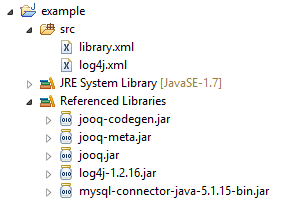
一旦项目设置正确,所有必需的工件都在类路径上,您可以为 org.jooq.codegen.GenerationTool 配置 Eclipse 运行配置。
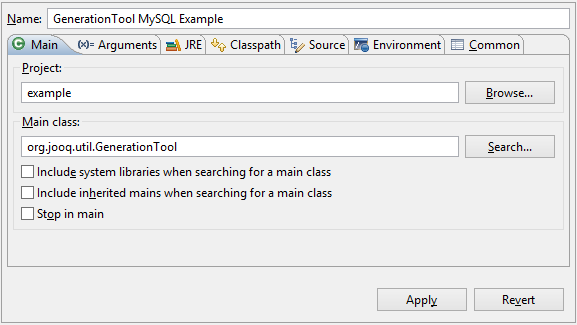
以 XML 文件作为参数
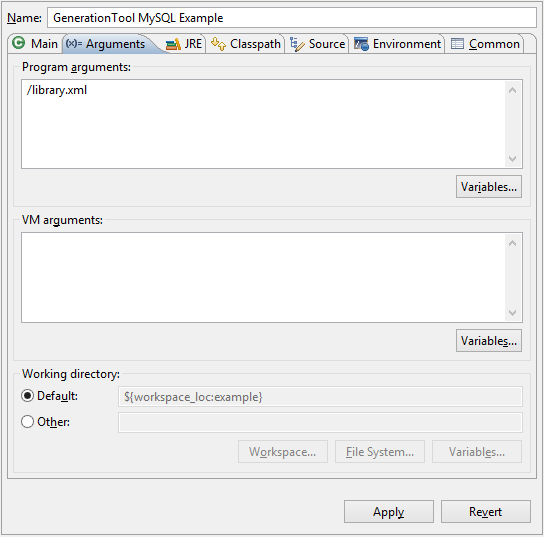
并正确设置类路径
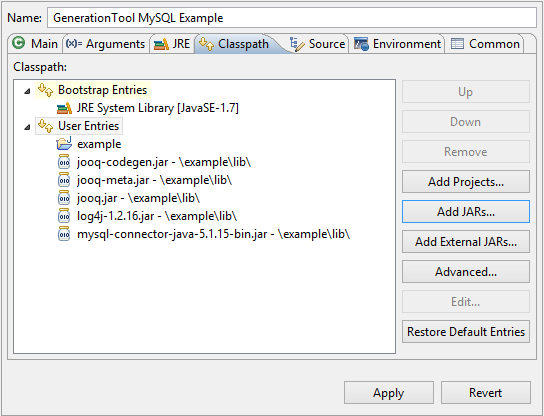
最后,运行代码生成并查看生成的工件
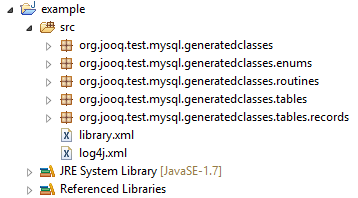
将生成与 Maven 集成
使用官方 jOOQ-codegen-maven 插件,您可以将源代码生成集成到 Maven 构建过程中
<plugin>
<!-- Specify the maven code generator plugin -->
<!-- Use org.jooq for the Open Source Edition
org.jooq.pro for commercial editions with Java 17 support,
org.jooq.pro-java-11 for commercial editions with Java 11 support,
org.jooq.pro-java-8 for commercial editions with Java 8 support,
org.jooq.trial for the free trial edition with Java 17 support,
org.jooq.trial-java-11 for the free trial edition with Java 11 support,
org.jooq.trial-java-8 for the free trial edition with Java 8 support
Note: Only the Open Source Edition is hosted on Maven Central.
Install the others locally using the provided scripts, or access them from here: https://repo.jooq.org -->
<groupId>org.jooq</groupId>
<artifactId>jooq-codegen-maven</artifactId>
<version>3.20.5</version>
<!-- The plugin should hook into the generate goal -->
<executions>
<execution>
<goals>
<goal>generate</goal>
</goals>
</execution>
</executions>
<!-- Manage the plugin's dependency. In this example, we'll use a PostgreSQL database -->
<dependencies>
<dependency>
<groupId>org.postgresql</groupId>
<artifactId>postgresql</artifactId>
<version>42.7.3</version>
</dependency>
</dependencies>
<!-- Specify the plugin configuration.
The configuration format is the same as for the standalone code generator -->
<configuration>
<!-- JDBC connection parameters -->
<jdbc>
<driver>org.postgresql.Driver</driver>
<url>jdbc:postgresql:postgres</url>
<user>postgres</user>
<password>test</password>
</jdbc>
<!-- Generator parameters -->
<generator>
<database>
<name>org.jooq.meta.postgres.PostgresDatabase</name>
<includes>.*</includes>
<excludes></excludes>
<!-- In case your database supports catalogs, e.g. SQL Server:
<inputCatalog>public</inputCatalog>
-->
<inputSchema>public</inputSchema>
</database>
<target>
<packageName>org.jooq.codegen.maven.example</packageName>
<directory>target/generated-sources/jooq</directory>
</target>
</generator>
</configuration>
</plugin>
在应用程序中使用 jOOQ 生成的类
请确保 jooq-3.20.5.jar 和您生成的包(参见配置)都位于类路径上。 完成此操作后,您可以使用生成的类执行 SQL 语句。

反馈
您对此页面有任何反馈吗? 我们很乐意听到它!